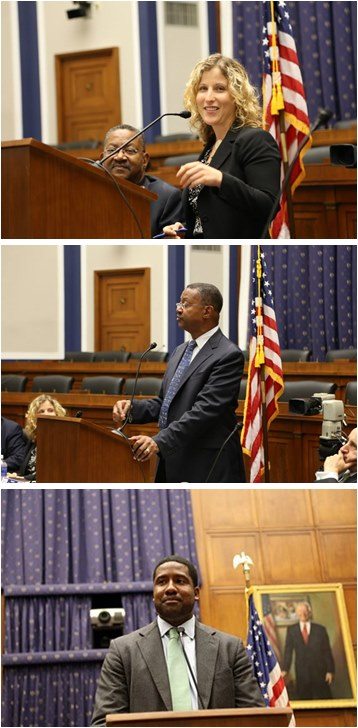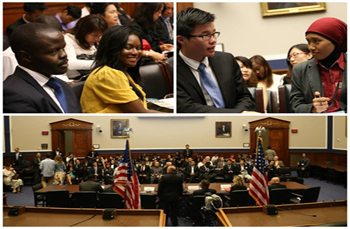The forum on Global Leadership held on Capitol Hill in lieu of the 5oth Anniversary of Dr. King’s “I have a dream” speech concluded that to be realizing the dream, true leadership that builds inter-cultural, inter-religious relationships based on common principles and values is needed.
This original blog post appeared on www.globalpeace.org

From top: Amy Lazarus, executive director of International Institute for Sustained Dialogue; John W. Franklin, Senior Manager, Office of External Affairs, National Museum of African American History and Culture; and Jason Washington, a former White House Fellow for the Leadership Development, at the Capitol Hill forum.
50 years ago, Dr. Martin Luther King Jr. posed the question, “Where do we go from here? Chaos or Community?”
Today we still face this great question. Will we stand together to build the beloved community or will we continue to harbor hate and misunderstanding?
Tuesday, the eve of the 50th anniversary of Dr. King’s “I have a dream” speech, the International Young Leaders Assembly convened a Global Forum on Visionary Leadership at the Rayburn Building on Capitol Hill asking, “How can we be realizing the dream?”
It is understood that while progress has been made, the dream of Dr. King is yet to be fulfilled. White House fellow Jason Washington said, “The reason the dream has not yet been fulfilled. There are still barriers implicit and explicit [therefore], there is still work to do.”
Hon. Peter Emmanuel Eriaku, a Parliamentarian from Uganda cautioned that each person should read and internalize King’s speech to understand what the dream really was. Dr. King was a spiritual man and a firm believer that we are all universal beings tied together by God, the creator. He believed that relationships are essential to the progress of humanity and that love must be the fuel for human interaction.
Mark Farr, President & CEO of The Faith & Politics Institute set the tone when he said, “The relationship paradigm is important to solve today’s problems.” John W. Franklin, Director of Partnerships and International Programs, at the Smithsonian’s National Museum of African American History and Culture also encouraged exchange across cultural, national and generational divides. He said, “We need to take dialogue into the future to understand each other better.”
The chasms and walls that exist in our world today sometimes seem insurmountable, but we do not stand alone, and together these barriers can be overcome.
Amy Lazarus, Executive Director, International Institute for Sustained Dialogue, told the participants, “Dr.King saw us moving toward a better future, but the change has to be championed. It won’t occur by itself. Good things demand risks.” She encouraged participants to practice courage, for “courage is like a muscle, it takes time to develop.” Alan Inman, president of Global Peace Foundation USA, called on participants to “Join in with the legacy of Dr. King, Mandela, Gandhi, Mother Teresa & be counted in history as someone that made a difference.”
To the question of “What do we need to do?” the answer seems to be that to realize that all of us are a part of the beloved community. And only through strengthening the bonds that bind us as brothers and sisters can the dream be realized. Or as the Parliamentarian from Uganda reminded us, use our “Soul force.”
For more reports on the IYLA visit: www.globalpeace.org

